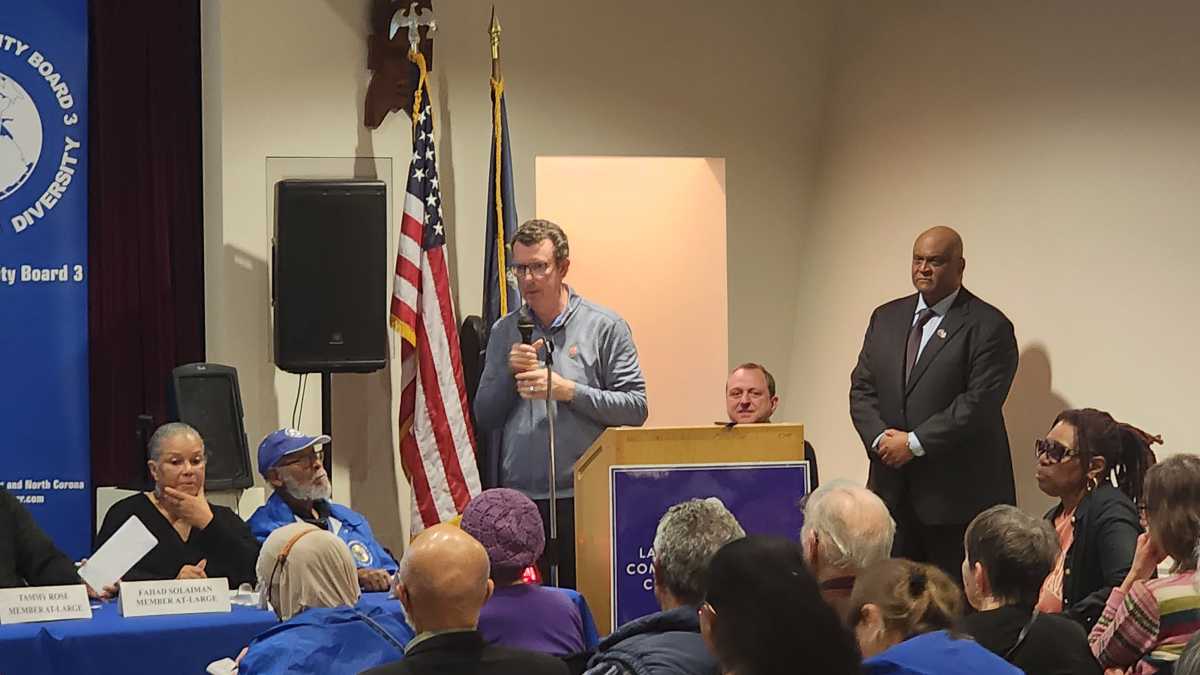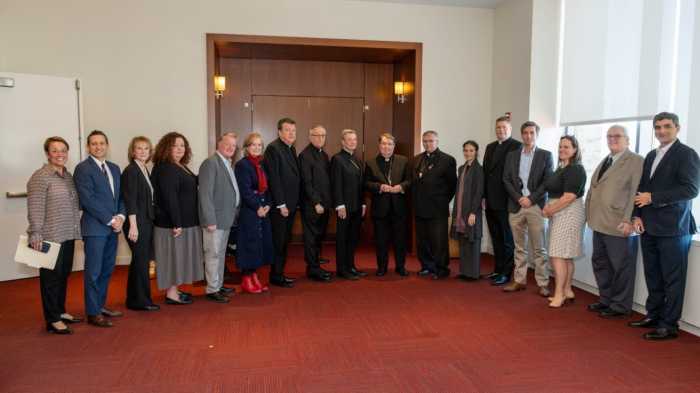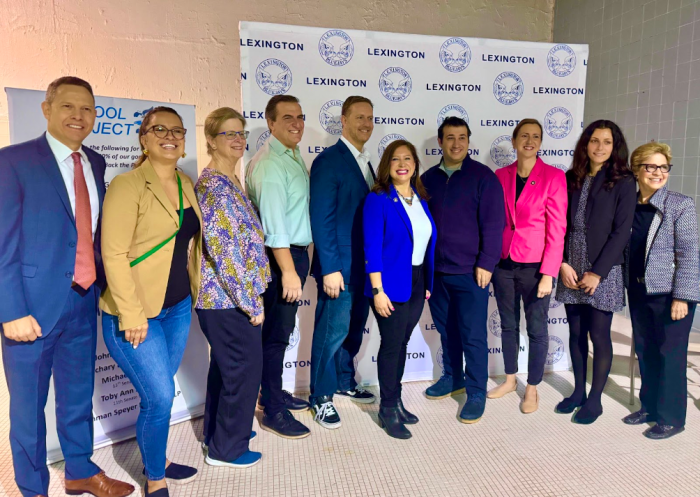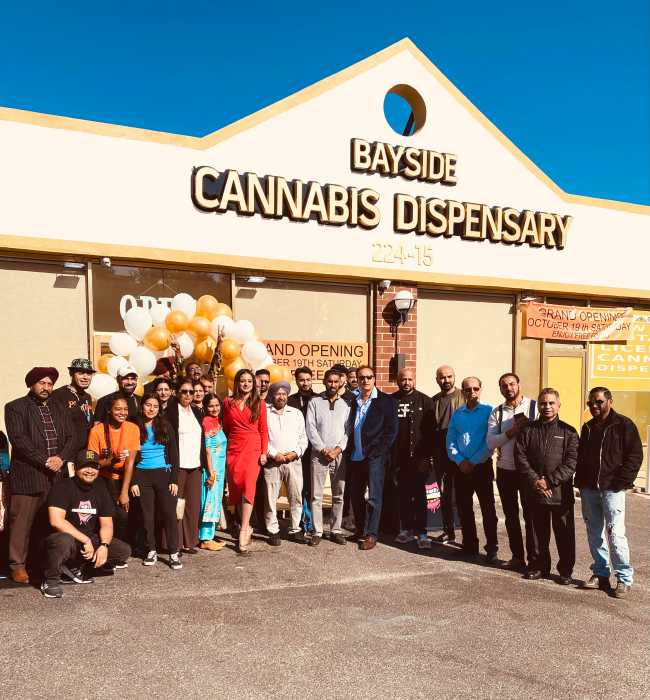Queens Community Board 3 voted overwhelmingly to approve modifications to zoning regulations for the planned $8 billion Metropolitan Park development at a fiery monthly meeting at Queens Public Library (QPL) Langston Hughes Thursday night.
More than 100 people crowded into the auditorium at QPL Langston Hughes at 100-01 Northern Blvd. on Nov. 21 to debate the Metropolitan Park proposal, a planned development by New York Mets owner Steve Cohen and Hard Rock Entertainment that would convert a 50-acre parking lot west of Citi Field into an entertainment complex with a casino as its centerpiece. The proposal also calls for a 25-acre public park, shops and restaurants, a Taste of Queens food hall, the redevelopment of the Mets-Willets Point subway station, and improved roads and bike paths.
Although the proposed development area is an asphalt parking lot, it is legally designated as city parkland, meaning zoning text and city map amendments must be approved before the project can proceed.
CB 3 became the fifth and final relevant community board to vote in favor of the proposal on Thursday night, voting 26-8 in favor of the amendment with three abstentions. CBs 6, 7, 8 and 9 already voted overwhelmingly in favor of the amendments, while CB 4 – the only other community district deemed “adjacent” to the project – delayed its vote until after the 60-day review period outlined in New York City’s ULURP process. The review period is set to expire on Dec. 2.
The proposal will next go to Queens Borough President Donovan Richards for an advisory review on Dec. 5 before going to the City Planning Commission, City Council and Mayor’s office as part of the ULURP process. Richards is a strong supporter of the Metropolitan Park proposal.
Thursday’s community board meeting was fraught with tension as more than a dozen vocal opponents to the Metropolitan Park proposal raised concerns about the project, stating that the development hinges on bringing a casino to a working-class neighborhood and arguing that such a development would negatively impact vulnerable people in the community, such as people with gambling addictions. Others stated that the 50-acre parcel earmarked for the project is public land and, as such, would be better served as a site for future affordable housing projects.
Opponents to the Metropolitan Park proposal, carrying placards bearing slogans such as “CasiNO” and “Quality Affordable Housing for All,” interrupted Thursday’s meeting on several occasions with chants of “Queens is not for sale” and arguing that they were not given a fair chance to voice their concerns. They alleged that CB 3 officials predominately chose people in favor of the proposal to speak at Thursday’s meeting.
NYPD officers were required to restore order to the meeting, while a number of those in favor of the project angrily told protesters to sit down.
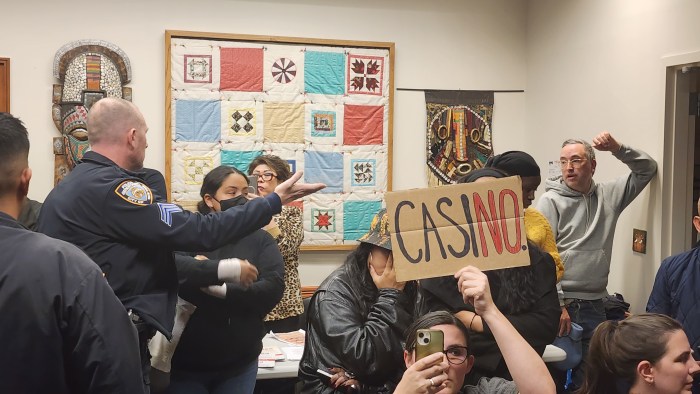
Those in favor of the project, on the other hand, argued that the Metropolitan Park proposal would bring thousands of union jobs to a working-class community as well as convert an asphalt parking lot into a public park. They also pointed to the fact that the developers have promised to make the Willets Point subway station ADA accessible as part of the project.
The $8 billion proposal hinges on the project winning one of the three downstate casino licenses approved by state legislators. Two of the licenses are expected to be handed to existing “racinos” – which have slot machines and horse racing but no traditional casino table games – making competition for the final gaming license fierce. Other projects vying for a downstate casino license have outlined proposals at Times Square, Hudson Yards, the United Nations, Coney Island, and the former Trump Links golf course in the Bronx, among other locations.
The Metropolitan Park project also faces further obstacles because the 50-acre site adjacent to Citi Field is technically public parkland and requires a parkland alienation bill in Albany to allow private development to take place at the site.
Local State Sen. Jessica Ramos said in May that she would not introduce the parkland alienation bill, stating that she was opposed to a proposed casino after polling her constituents. She reiterated her opposition to the proposal at the CB 3 meeting Thursday night, drawing significant applause from the packed auditorium.
Metropolitan Park spokesperson Karl Rickett told amNewYork in September that Ramos’ opposition didn’t necessarily kill the project, and in fact, any senator could theoretically introduce the parkland alienation bill in Albany’s upper chamber.
Speaking on Thursday night, Ramos said three-quarters of the local residents that she has polled have stated their opposition to Metropolitan Park, particularly because of the present condition of Roosevelt Avenue, which has faced a rise in criminal activities such as prostitution and shoplifting.
“Roosevelt Avenue has a lot of challenges in that the underground economy is very much above ground,” Ramos said after addressing CB 3 Thursday. “There are many people who in their comments that they have sent to me throughout this process, who have mentioned that a casino on Roosevelt Avenue doesn’t feel like it would make the situation better, but rather that it would attract unsavory people.”
Ramos, who is running for Mayor, said she believes more “wholesome” alternatives to casinos should be put forward as drivers of economic development in New York City.
“Why are casinos our prime economic development idea in New York City?” Ramos said. “I think there are many other different ways that we could generate revenue that are wholesome and family-oriented.”
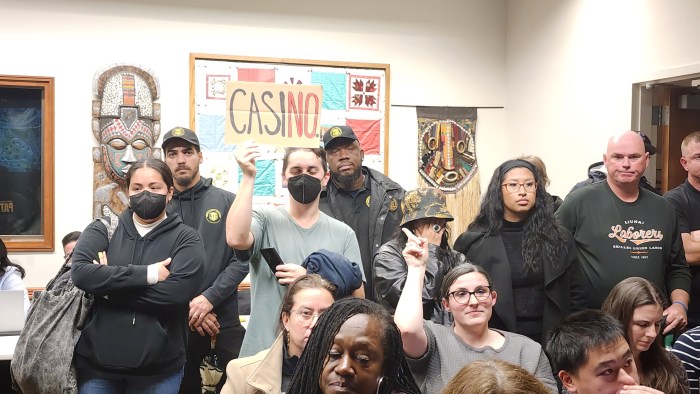
On the other hand, Larinda Hooks, assembly member-elect for District 35, which covers portions of Flushing Meadows-Corona Park, impassionedly defended Metropolitan Park, stating that it would bring thousands of much-needed jobs to an area at the epicenter of the COVID-19 pandemic.
“It actually gives some dignity to a community that was the epicenter of the epicenter of Covid, where many of the jobs are gone because companies didn’t survive,” Hooks said. “We have so many people in our community looking for work, and our food pantry lines are like 400 (people long). These people need jobs… So I just think this is going to be a game changer.”
“I think you’re not painting a full picture about the impacts on families, especially among local communities,” Michelle told Sullivan. “Many of them are living in poverty and going to be going to the casino because it’s that much closer. And I think that’s something that needs to be talked about. I don’t think it’s just this glorious new park space.”
Paul Pellizzari, vice president of global social responsibility at Hard Rock International, addressed the issue on Sullivan’s behalf, stating that Hard Rock will take steps to prevent and reduce problem gambling at the Metropolitan Park casino.
“Our business is not premised on addiction, and it’s not good for our business,” Pellizzari said. “It’s not good for the health community. It’s not good for our team… We train all of our guest-facing team members, whether you’re a slot attendant, drink server, or people who work in the restaurants, to look for signs of a problem.”
He also pointed to the fact that local residents can already access nearby casinos in Connecticut and Atlantic City.
Tahia Islam and Elizabeth Birriel, Elmhurst residents and members of the Party for Socialism and Liberation who were among those who interrupted Thursday’s meeting to protest against the development, told QNS that the casino was problematic and accused Sullivan of obfuscating the nature of the development by describing the casino as a gaming center throughout his presentation. Islam and Birriel also believe that the site designated for Metropolitan Park would be better served as an affordable housing development.
“They presented an entire marketing presentation without saying the word casino, calling it a gaming piece,” Islam said. “They haven’t named it for what it is, and that’s an intentional choice.
“We want the green spaces. We want affordable housing… but for whose interests will these things get made?”
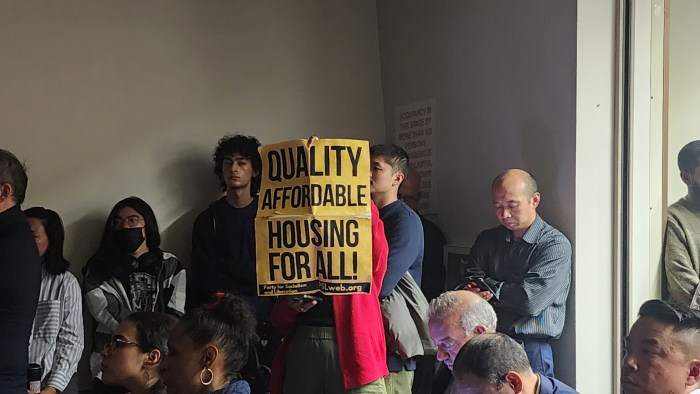
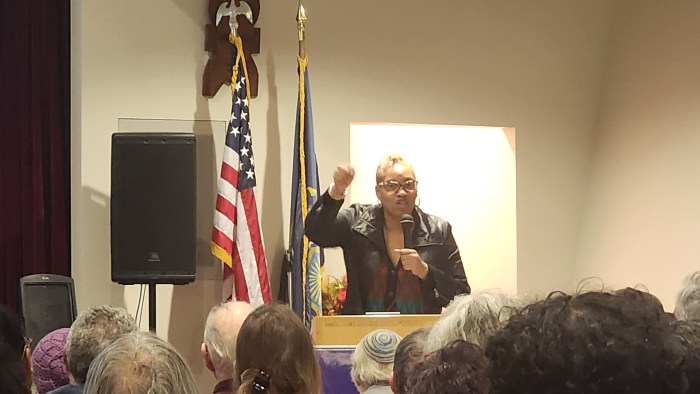
She accused those opposed to Metropolitan Park of “insulting” the local community by speaking on their behalf about addiction, noting that 60% of the addiction cases that Elmcor deals with are alcohol-related related cases. Dunston commented that CB 3 has approved more than 300 liquor licenses in the past four years, with none of those cases receiving anywhere near the level of opposition on the basis of addiction problems.
“The fact that people think they can speak on our behalf, put people in front of us as if we don’t know what’s going on, is an insult,” Dunston said.
Similarly, Hooks said her constituents in Assembly District 35 were tired of being told what is good for them.
“AD 35 is predominantly a minority black and brown community, and for years, our voices have been stifled,” Hooks said. “We are very vocal on what we want. We are smart, intelligent people, and can articulate what we want, and we will go forward. So the time of everyone telling us what we want, telling us what we need, that’s history.”
Thomas Grech, CEO of Queens Chamber of Commerce, said the Metropolitan Park proposal represented a life-changing opportunity for the local community, who will benefit from thousands of new jobs.
“These jobs matter. They change lives. They change lives every day,” Grech said.
Elmhurst Hospital CEO Helen Arteaga also spoke out in favor of the project, stating that the jobs that Metropolitan Park will create will also provide local residents with access to good healthcare.
Sullivan outlined how the Metropolitan Park project will create around 23,000 temporary and permanent jobs, stating that the project will implement a Queens hiring priority wherever possible.
“A lot of our brothers and sisters and neighbors live here in Queens, they would rather work at a project that’s five or 10 minutes from home and not have to go 45 minutes or an hour up to Long Island or into Manhattan. This is a tremendous opportunity for them.”
He noted that Minority and Women-Owned Business Enterprises (MWBE) will make up a minimum of 30% of the development but said Cohen’s team aims to “go beyond that”.
Sullivan additionally said Hard Rock would introduce a loyalty program at the Metropolitan Park development if it came to fruition, stating that Hard Rock has already partnered with more than 100 Queens restaurants to ensure that guests who earn points at Hard Rock hotels can redeem rewards in Queens establishments. He said Hard Rock was also partnering with local Queens-based institutions, such as LaGuardia Airport.
He said the $8 billion project includes a $1 billion community development commitment, including $320 million for a 25-acre public park along the west side of Citi Field, $480 million for ADA improvements and climate resiliency at the Willets Point subway station, $50 million for the Taste of Queens food hall featuring local restaurants from across the borough, $25 million for projects in the surrounding areas and a $163 million community development fund that would provide funds to local non-profits.
“If we do nothing, it’ll remain a parking lot,” Sullivan said. “We really view this as a once-in-a-generation opportunity to transform the area around Citi Field.”
Sullivan also pointed out that the Metropolitan Park team has conducted more than four years of community input, meeting more than 1,000 members of the local community and conducting 16 workshops. He noted that several comments and suggestions made by community members and leaders have been adopted for the Metropolitan Park plan.

